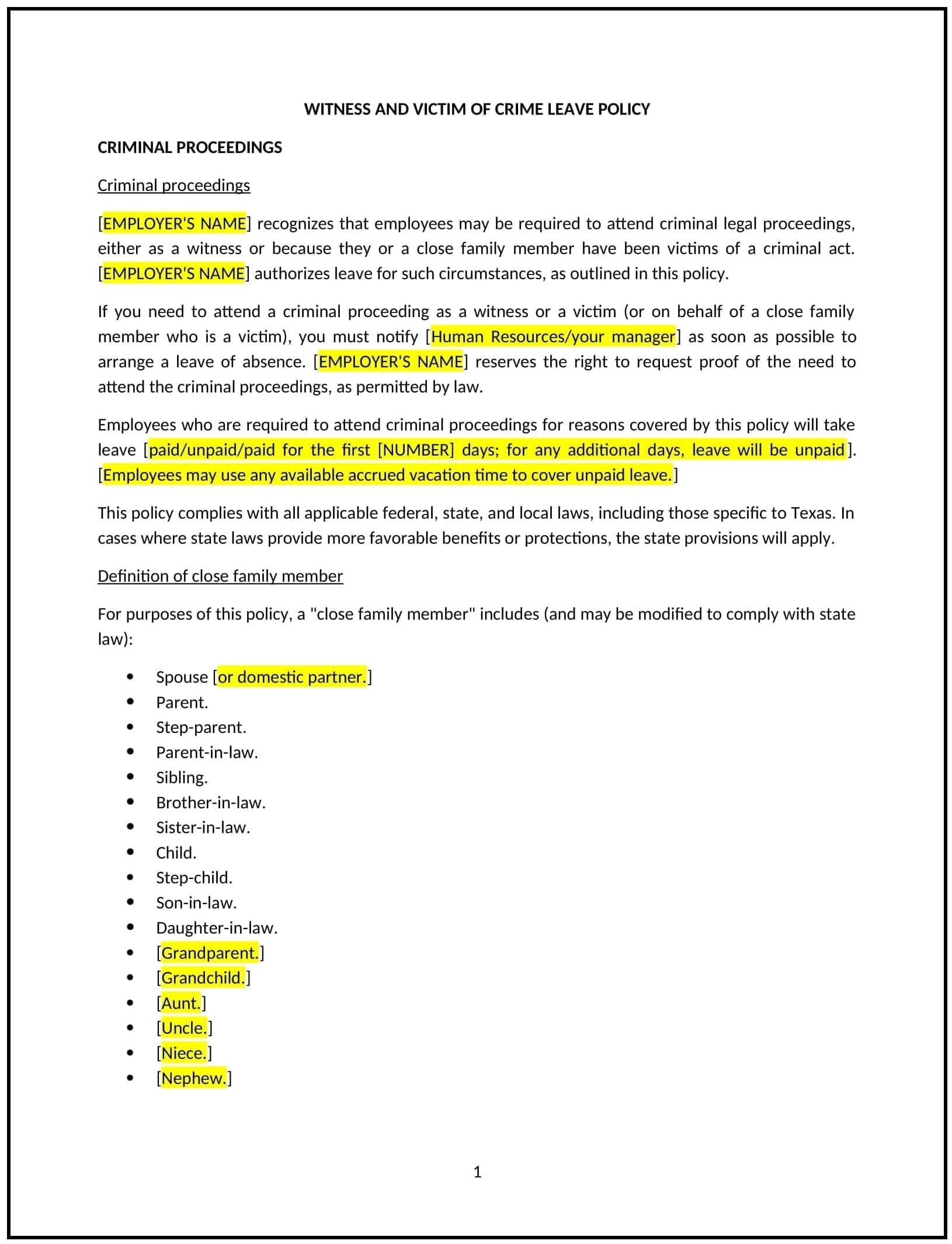Witness and victim of crime leave policy (Texas): Free template
Got contracts to review? While you're here for policies, let Cobrief make contract review effortless—start your free review now.

Customize this template for free
Witness and victim of crime leave policy (Texas)
This witness and victim of crime leave policy is designed to help Texas businesses provide clear guidelines for employees who need time off to participate in legal proceedings, including serving as a witness in a criminal case or dealing with the aftermath of being a victim of a crime. The policy outlines how employees can request leave, the types of leave available, and the company’s expectations for documentation and communication during such absences.
By adopting this policy, businesses can support employees dealing with criminal cases, improve legal compliance, and promote a compassionate and understanding work environment.
How to use this witness and victim of crime leave policy (Texas)
- Define eligible leave situations: Clearly outline the situations where leave is applicable, such as serving as a witness in a criminal case, attending a trial, or managing the aftermath of being a victim of a crime. The policy should specify the types of crimes that qualify for leave, such as violent crimes or fraud.
- Set eligibility criteria: Specify the eligibility requirements for employees to take leave, including whether full-time, part-time, or temporary employees are eligible. The policy should also state whether any length-of-service requirements apply.
- Specify the leave process: Outline how employees should request time off, including the notice required before taking leave, whether advance approval is needed, and what documentation (e.g., court summons or police report) is necessary to support the request.
- Clarify paid vs. unpaid leave: Define whether leave for being a witness or victim of a crime is paid or unpaid. If leave is unpaid, specify whether the employee can use paid time off (PTO) or sick leave, if available.
- Address job protection: Ensure that employees are not penalized or discriminated against for taking time off due to their involvement in a criminal case, whether as a witness or victim. The policy should reassure employees that their job will be protected during their absence.
- Set limits on leave duration: Specify the maximum number of days employees can take off for each situation, including any limitations on leave for attending court or dealing with the aftermath of a crime.
- Address return-to-work expectations: Clarify the process for returning to work after taking leave, including any requirements for notifying the employer of the employee's return and any necessary accommodations for the employee’s return to the workplace.
Benefits of using this witness and victim of crime leave policy (Texas)
This policy offers several benefits for Texas businesses:
- Promotes employee well-being: By offering time off for employees dealing with crime-related issues, businesses demonstrate care and concern for their employees’ emotional and physical well-being.
- Enhances legal compliance: By following Texas state laws regarding leave for witnesses and victims of crime, businesses avoid potential legal challenges related to employee rights and job protection.
- Increases employee retention: Offering leave in sensitive situations helps create a positive and supportive workplace culture, improving employee morale and retention.
- Reduces workplace disruptions: Clear guidelines for leave requests and documentation ensure that employees’ absences are managed efficiently, minimizing disruptions to business operations.
- Enhances company reputation: A company that demonstrates support for employees facing difficult personal situations, such as involvement in a criminal case, enhances its reputation as a compassionate and responsible employer.
Tips for using this witness and victim of crime leave policy (Texas)
- Communicate the policy clearly: Ensure that all employees are aware of the witness and victim of crime leave policy, including how to request leave, the types of leave available, and the documentation required.
- Provide a straightforward process: Make the process for requesting leave simple and easy to understand, including clear steps for submitting documentation and notifying managers of the need for time off.
- Monitor leave requests: Keep track of employees’ leave requests to ensure that time off is being granted consistently and fairly, and to avoid business disruptions.
- Be compassionate and flexible: While adhering to the policy, ensure that employees are treated with understanding and flexibility, especially in emotionally difficult situations.
- Ensure fairness: Apply the policy consistently to all employees, regardless of role or seniority, to avoid potential conflicts or perceptions of unfair treatment.
- Review regularly: Periodically review the policy to ensure it is compliant with Texas state laws, reflects changes in business practices, and meets the needs of both employees and the company.